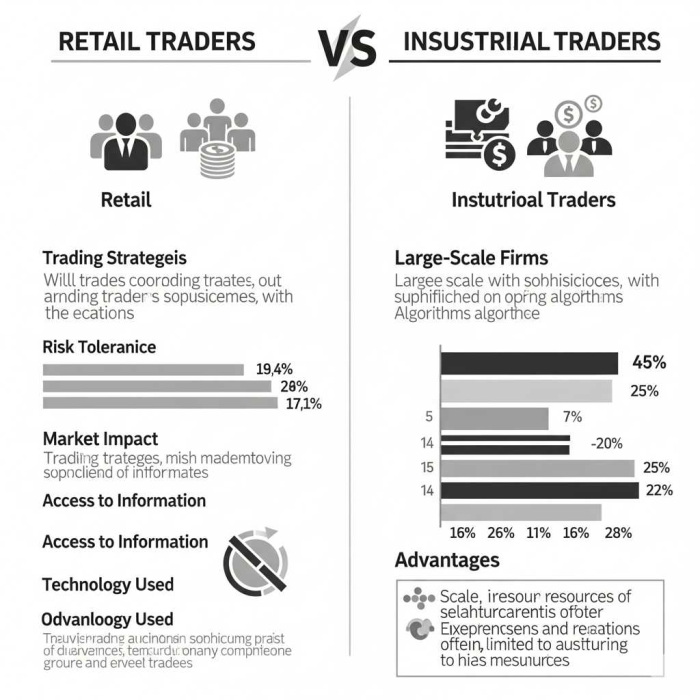Retail Rumble vs. Institutional Intel | Who Comes Out on Top in the Markets?
The financial markets often feel like a vast, bustling arena. On one side, you have the individual investor, often trading from their living room. On the other, towering institutions with seemingly unlimited resources and an army of experts. This dichotomy begs the question: how do retail traders stack up against their institutional counterparts? Let's dive into the fascinating world of retail vs. institutional trading.

Defining the Players
First, let's clarify who we're talking about:
- Retail Traders: These are individual investors who trade for their own personal accounts. They typically use online brokerage platforms and often have a smaller capital base. Think of anyone from a day trader making rapid-fire decisions to a long-term investor building their retirement portfolio.
- Institutional Traders: These are entities like hedge funds, mutual funds, pension funds, investment banks, and other large financial organizations. They trade on behalf of clients or their firm, managing vast sums of capital. Their trading desks are bustling hubs of activity, equipped with cutting-edge technology and staffed by highly specialized professionals.
The Key Differences
The distinctions between these two groups are numerous and significant, influencing their approaches, advantages, and disadvantages.
Capital and Resources: A Chasm of Difference
This is perhaps the most obvious disparity. Institutional traders command immense capital, allowing them to make large-scale trades that can influence market prices. They also have access to:
- Sophisticated Technology: High-speed trading algorithms, advanced analytics software, and direct market access are standard for institutions.
- Extensive Research: They can afford dedicated teams of analysts, economists, and strategists, subscribing to premium data services and conducting in-depth proprietary research.
- Leverage: While retail traders have access to leverage, institutions can often secure much larger lines of credit and favorable borrowing terms.
Retail traders, on the other hand, operate with comparatively limited capital. While technology has become more accessible, they often rely on publicly available information and less sophisticated tools.
Information Access and Flow: The Insider Edge?
Institutional traders often have access to information before it hits the mainstream. This can include:
- Proprietary Information: Research and analysis generated internally.
- Early Insights: Due to their deep connections within the financial industry, they may get earlier indications of corporate actions, economic data, or large block trades.
- Direct Access to Companies: Institutional investors frequently meet directly with company management, gaining insights not always available to the public.
Retail traders primarily rely on publicly available news, financial reports, and social media. While the internet has democratized information, there's still a time lag and a filtering process.
Psychological Factors and Discipline: The Human Element
This is where the playing field can sometimes level, or even tilt, in favor of the retail trader.
- Emotional Trading: Retail traders are often more susceptible to emotional biases like fear and greed, leading to impulsive decisions. The pressure of personal capital can be intense.
- Discipline: Institutional trading, especially at larger firms, is highly disciplined and process-driven. Decisions are often made by committees or algorithms, reducing the impact of individual emotions. However, even institutional traders can be susceptible to herd mentality or groupthink in certain market conditions.
- Agility: Retail traders can be incredibly agile, making quick decisions and adapting their strategies rapidly. Institutions, with their layers of approval and larger positions, can be slower to react to sudden market shifts.
Regulatory Scrutiny: Different Standards
Institutions face a far higher level of regulatory scrutiny and compliance requirements. They are subject to extensive rules and regulations designed to protect investors and maintain market integrity. Retail traders, while still subject to rules, have a less stringent regulatory burden.
Who Wins? It's Not a Simple Answer
It's tempting to conclude that institutional traders always have the upper hand. And in terms of resources, information, and raw buying power, they certainly do. However, the market is not a zero-sum game played solely on these terms.
-
For Retail Traders:
- Niche Strategies: Retail traders can thrive by focusing on specific, smaller-cap stocks or niche strategies that don't attract institutional attention.
- Lower Fees: They often face lower transaction costs compared to the complexities of institutional trading.
- Freedom and Flexibility: They have complete control over their decisions and are not beholden to clients or strict mandates.
- Learning and Growth: The journey of a retail trader can be incredibly rewarding, fostering financial literacy and analytical skills.
-
For Institutional Traders:
- Scale and Impact: Their ability to move large blocks of capital allows them to implement strategies that are simply not feasible for individuals.
- Risk Management: Sophisticated risk management systems are integrated into their operations, designed to protect vast portfolios.
- Diversification: They can achieve a level of portfolio diversification that is difficult for most retail traders.
The Evolving Landscape
The gap between retail and institutional trading is narrowing in some areas. Discount brokerages, fractional shares, and readily available financial education have empowered retail investors like never before. Social media platforms have also allowed retail traders to collectively influence certain stocks, as seen in recent "meme stock" phenomena.
However, the fundamental advantages of institutions in terms of capital, technology, and information access remain.
Conclusion
The world of trading is a complex ecosystem. Retail traders and institutional traders play distinct but often interconnected roles. While institutions may dominate in terms of sheer power and resources, retail traders possess unique advantages in agility, freedom, and the potential for significant individual growth. Understanding these differences is crucial for anyone looking to navigate the exciting and challenging waters of the financial markets. Whether you're a lone wolf or part of a formidable pack, success ultimately boils down to sound strategy, disciplined execution, and a continuous commitment to learning.
Popular Tags